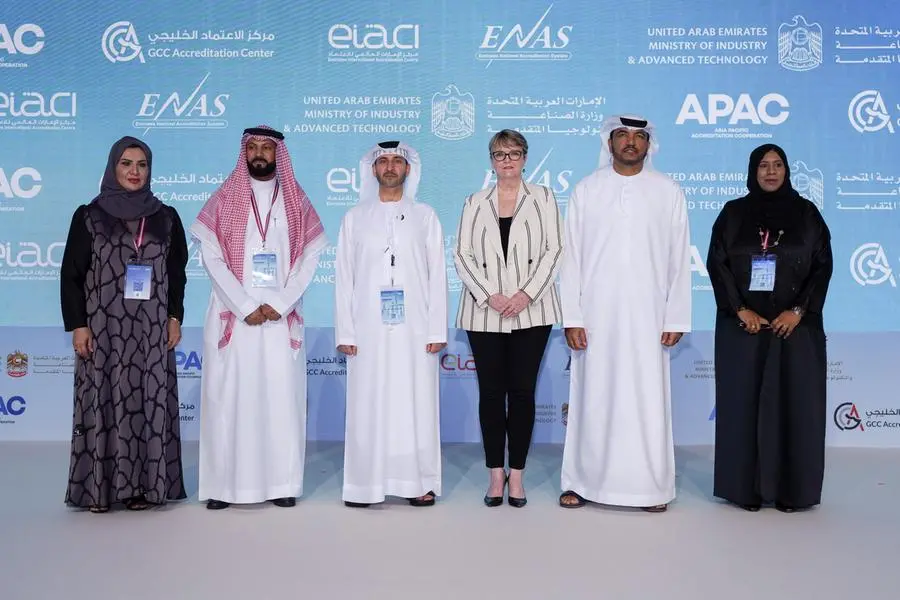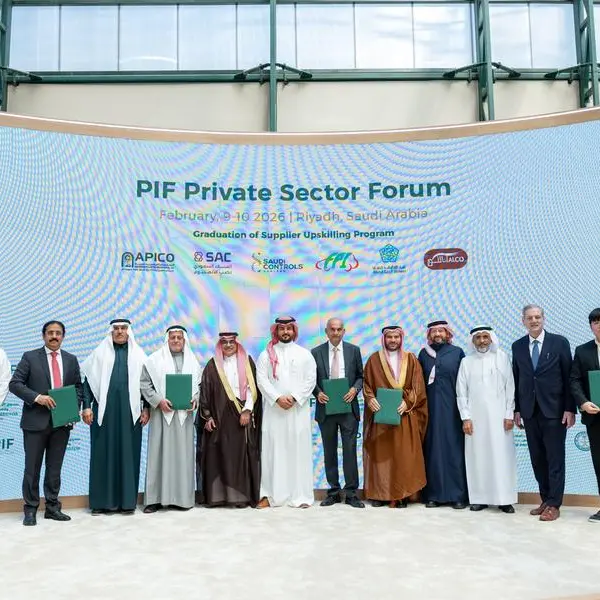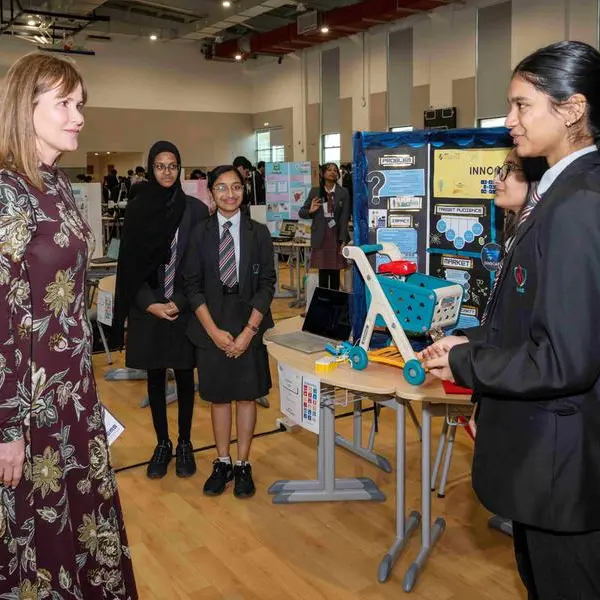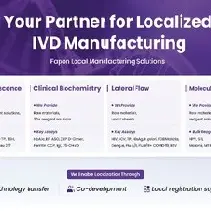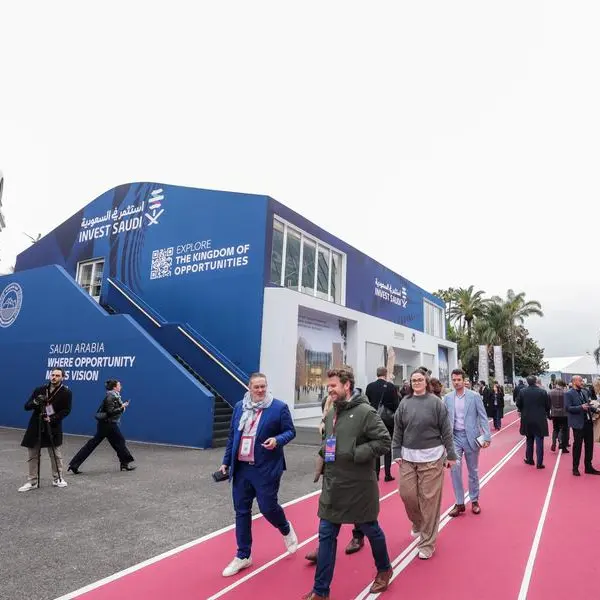PHOTO
- APAC Annual Meetings are hosted in partnership with Ministry of Industry and Advanced Technology, the Gulf Accreditation Center, and the Emirates International Accreditation Center.
HE Omar Al Suwaidi:
- The UAE’s quality infrastructure is a cornerstone of the industrial environment, and international investors are invited to leverage benefits through ‘Make it in the Emirates’.
- Industrial exports in the UAE has grown by 60 percent, with the industrial sector contributing AED205 billion to national GDP.
- The UAE’s quality infrastructure is fully integrated with MoIAT’s initiative such as Future Industries Lab, the National ICV Program, and Make it in the Emirates initiative to attract industrial investment and boost innovation.
Dubai-UAE – The Ministry of Industry and Advanced Technology (MoIAT), through its Emirates National Accreditation System (ENAS), has partnered with the Gulf Accreditation Center (GAC) and the Emirates International Accreditation Center (EIAC), to host the 2024 Asia-Pacific Accreditation Cooperation (APAC) Annual Meetings in Dubai under the theme “Accreditation: Empowering Tomorrow and Shaping the Future”. The meetings, which run until July 18th, are attended by representatives from 65 national accreditation bodies in the Asia-Pacific region, along with international experts in accreditation and conformity assessment.
International positioning
By hosting the meetings in the UAE, the country is reinforcing its position as a leading destination for major regional and international organizations in the field of quality infrastructure, a key pillar of Operation 300bn. The initiative contributes to boosting the attractiveness of the industrial ecosystem, innovation, and regional and global competitiveness, while also enhancing product quality and facilitating trade exchange through unified processes and standards and mutual recognition of conformity assessments.
At the event, the entities will work to boost recognition of conformity assessments between markets, with the aim of facilitating trade and increasing confidence in products among APAC members.
The event features the participation of His Excellency Omar Al Suwaidi, Undersecretary of MoIAT; Jennifer Evans, Chair of the Asia-Pacific Accreditation Cooperation (APAC); His Excellency Dr. Waleed Alhosani, Head of Economic Affairs at the Secretariat General of the Gulf Cooperation Council; Amina Ahmed Mohammed, CEO of EIAC; and Eng. Moteb Al-Mezani, Director General of GAC.
HE Omar Al Suwaid said: “Hosting the APAC Annual Meetings for the first time in the UAE aligns with the National Strategy for Industry and Advanced Technology, where quality infrastructure is a key pillar for Operation 300bn. The meetings aim to enhance the productivity of the UAE’s industrial sector and deploy best international practices in standards and conformity, boosting efforts to achieve sustainable development and developing an attractive industrial ecosystem.
His Excellency added: “The UAE’s quality infrastructure is fully integrated MoIAT’s initiatives such as The National In-Country Value program and Make it in the Emirates to attract industrial investments and encourage innovation within the sector. Industrial exports have reached AED187 billion, growing by more than 60 percent by the end of 2023, compared to 2020 when MoIAT was first established. While industrial productivity increased 27 percent by the end of 2023, which made the industrial sector the second largest contributor to the country’s GDP at a value of AED205 billion, marking an increase of 55% compared to 2020.”
His Excellency noted: “MoIAT will continue to implement its initiatives to support the growth of the industrial sector through a mature quality infrastructure ecosystem integration in partnership with local organizations, federal entities, and private sector companies. Which has earned a global reputation in recent years by hosting events such as the International Electrotechnical Commission (IEC), the International Organization for Standardization’s ISO Annual Meeting, and APAC meetings.”
Al Suwaidi also noted, “The UAE ranks first in the region and 11th globally in the United Nations Industrial Development Organization's (UNIDO) Quality Infrastructure Sustainable Development Index and the International Network and Quality Infrastructure (INet QI). This is the result of continuous efforts to create regulations and standards, which now exceed 27,000 covering vital and priority sectors, including technology, health, education, agriculture, and future industries. The UAE’s high ranking has also been achieved based on the five main pillars of metrology, legislation, standards, conformity, and accreditation, which help companies reach international markets.”
Seminars and Meetings
An interactive session, titled ‘Shaping the Future: Innovations and Progress in the UAE’, explored how accreditation can help prepare for change and boost the quality and competitiveness of local products. The session was moderated by Dr. Qasim Al Shamsi, Director of Medical Accreditation at EIAC, with participation of Her Excellency Dr. Farah Al Zarooni, Assistant Undersecretary for Standards and Legislation at MoIAT; Major General Khaled Nasser Al Razooqi, Director General of Artificial Intelligence at Dubai Police; Ghaith Al Suwaidi, Director of Data Science and Advanced Analytics at Dubai Data Establishment; Mohammed Al Balooshi, Head of Space Operations at the Mohammed Bin Rashid Space Centre; and Samara bin Salem, Director of Technical Affairs at the Abu Dhabi Quality and Conformity Council.
A Shared Platform
The APAC Annual Meetings serve as a shared platform for accreditation bodies to discuss policies and align practices and future plans, as well as expand Mutual Recognition Arrangements (MRAs) for conformity assessments across the Asia-Pacific region.
APAC was established in 2019, following the merger of two regional organizations: The Asia Pacific Laboratory Accreditation Cooperation (APLAC) and the Pacific Accreditation Cooperation (PAC). The organization focuses on enhancing MRAs for conformity assessments among member countries, which enhances trust in products and services, boosting trade.
